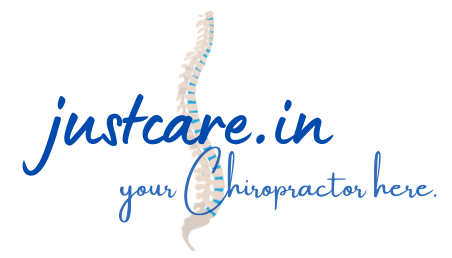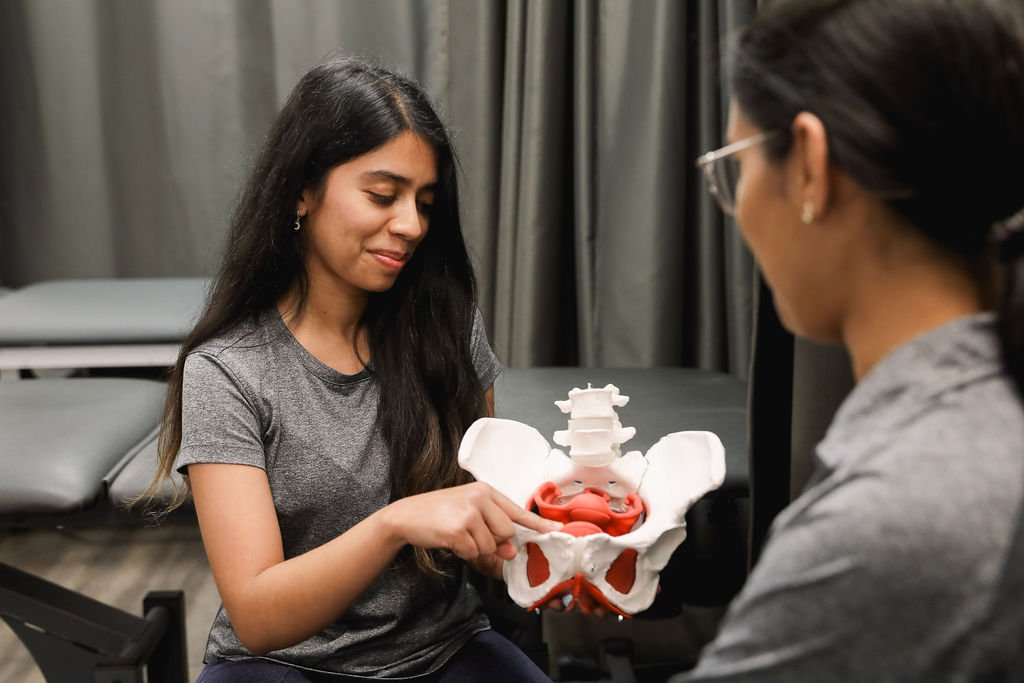- ramkripalsinghh9@gmail.com
- Shop no 6 Shree hari township Ajwa road, Vadodara
Call Now:
- +91-9898395900
- +91-9426583736

The pelvic floor muscles are at the base of the pelvis and attach from the pubic bone at the front to the tail bone at the back. They are like a hammock and support the bladder, uterus and bowel. They also help control the bladder and bowel and play a role in sexual function.
If the pelvic floor muscles are weak, they can contribute to poor bladder and bowel control and pelvic organ prolapse. If you are unable to relax your pelvic floor you may have problems with bladder and bowel emptying or sexual and pelvic pain.
Our specifically trained Physiotherapists will evaluate the function of your pelvic floor muscles and assess your ability to contract and relax these muscles. Pelvic floor muscle training under the guidance of a Pelvic Floor Physiotherapist is recognised as an effective treatment for these problems.

Many women experience bladder leakage. No matter how light, it’s not normal. You don’t have to live with it or suffer in silence. In most cases, bladder problems can be cured or managed better.
Loss of bowel control and constipation are highly distressing problems that are seldom talked about. These problems can have a huge impact on your life. You might find yourself avoiding intimacy and social situations and too worried to leave the house in the morning if you haven’t had a bowel action. Constipation and difficulty emptying your bowel can leave you feeling bloated, uncomfortable and sluggish.
One in five women experience vulval pain or painful sex, but most are too embarrassed to talk with their doctor or confide in a friend. These symptoms are often highly distressing, leading to women withdrawing socially, avoiding relationships and intimacy, and reducing self-esteem. The two most common conditions associated with vulval or sexual pain are vaginismus and vulvodynia.
Hysterectomy is the most common female surgery. Preparing for and recovering from pelvic and vaginal surgery is easier with expert advice as there are many activities which can impact healing and your comfort during recovery. Professional advice gives you peace of mind during your recovery and enables you to return to your normal level of activity with confidence. Your recovery from surgery and long term outcome can be impacted by many factors including constipation, heavy lifting, returning too quickly to strenuous activities and poor pelvic floor muscle function. Occasionally after surgery woman can experience problems such as bladder leakage or painful sex.
Endometriosis occurs when tissue similar to the lining of the uterus grows in other parts of your body. It is most commonly seen inside the pelvis, and can affect your uterus, bladder, bowel, ovaries, or fallopian tubes. During menstruation, this tissue also bleeds, which can cause pain, inflammation, scarring, and adhesions in your pelvis. There are different stages of the condition, and the severity of symptoms doesn't always correlate with the severity of the endometriosis. We know this because pain is not always relieved after removing the endometriosis through surgery, or hormonal treatment to suppress menstruation. Changes to the nervous system (brain, spinal cord and nerves) may explain why some people don't respond to traditional methods to treat their endometriosis-related pain. Adenomyosis is another condition that leads to painful, heavy periods, pelvic pain and sexual pain. Adenomyosis occurs when cells similar to the lining of the uterus are also present in the muscular wall of the uterus. Similar to endometriosis, this tissue also bleeds during menstruation, causing small collections of blood in the uterine wall. We know that the nervous system can also become involved in the pain experience.
Every woman can benefit from a pelvic floor muscle check. Your pelvic floor muscles should be able to correctly contract and fully relax. You may not have symptoms now but if your pelvic floor muscles are weak or not relaxing, you could develop bladder leakage, prolapse or sexual pain. Prevention really is better than a cure.
Painful bladder syndrome is the term used to describe persistent pain in the bladder or urethra in the absence of infection or other identified pathology. Interstitial cystitis is a subtype of painful bladder syndrome, where specific inflammatory changes are found in the lining of the bladder on cystoscopy or bladder biopsy. The exact cause of painful bladder syndrome and interstitial cystitis is not known.
Pelvic Organ Prolapse is when one or more of the organs (the uterus, bladder, urethra or bowel) in the pelvis drop. This can be bothersome and annoying. It can also have a huge impact on your life, making day to day living uncomfortable and normally enjoyable activities unpleasant. Many women experience Pelvic Organ Prolapse but you don’t have to live with it or suffer in silence. In many cases, Pelvic Organ Prolapse can be better managed, its symptoms reduced and its progression prevented.
Persistent pelvic pain is a condition experienced by women, but is rarely spoken about. Also known as chronic pelvic pain, persistent pelvic pain is pain felt in the pelvic area, which can include the vagina, anus, coccyx, lower abdomen, hips, present for more than 6 months. Those experiencing pelvic pain will often also notice changes in their bladder or bowel function, or have pain with sex. Pelvic pain is unique as the pelvis is home to the reproductive organs and crucial private bodily functions that we often don’t talk about, making pain in this area highly distressing. Common conditions associated with pelvic pain are endometriosis, painful bladder syndrome, interstitial cystitis, pudendal neuralgia, coccydynia, vaginismus or vulvodynia.
Prostate cancer and surgery can be a difficult journey both emotionally and physically for men and their family. Loss of bladder control is to be expected after prostate surgery and is distressing. Fortunately we know that bladder control will improve over time and with physiotherapy. During removal of the prostate your main control mechanism may be impaired, leading to bladder leakage. The pelvic floor, which is part of your bladder control mechanism, will need to play a greater role to compensate for this. Ideally pelvic floor exercises are commenced before surgery but they can also help afterwards. Urine may leak unexpectedly after surgery, especially with physical activity, coughing or sneezing. How much urine leaks and how long this incontinence lasts is hard to predict however it can be reduced by learning how to use the pelvic floor muscles correctly.
Constipation and loss of bowel control are highly distressing problems that are seldom talked about. These problems can have a huge impact on your life. Constipation and difficulty emptying your bowel can leave you feeling bloated, uncomfortable and sluggish. You might find yourself avoiding intimacy and social situations and too worried to leave the house in the morning if you haven’t had a bowel action. Many men experience bowel problems but feel too embarrassed to ask for help. The good news is that you don’t have to live with it or suffer in silence. Help is available.
Chronic pelvic pain is a hidden problem. It can't be seen, it’s hard to diagnose and often men suffer for many years before finding help. Chronic pelvic pain in men is more common than you think and is very distressing, both physically and emotionally. If you have difficulty relaxing your pelvic floor muscles they can become chronically tense and overactive. Tense, tight pelvic floor muscles are painful and can lead to ongoing pelvic, sexual and bladder pain. It’s like having a headache in the pelvis. You may have been diagnosed with chronic prostatitis or painful bladder syndrome. In most of these cases the pelvic floor muscles are tight and painful.
The inability to achieve or maintain an erection is common, especially as men age. Diminishing sexual performance is distressing and can affect sexual intimacy, self-esteem, confidence, relationships and quality of life. There are many factors, including your pelvic floor,that can affect your ability to maintain an erection. The pelvic floor muscles in men play an important role in gaining and maintaining an erection. Research has shown that men with strong pelvic floor muscles have better erectile function. Men of all ages can experience erectile dysfunction. Although erectile dysfunction is more common as you age that doesn’t mean it is inevitable or normal. You don’t have to live with it or suffer in silence. Help is available.
Difficulty controlling and emptying your bladder are frustrating and embarrassing problems that can have a huge impact on your life. You might find yourself feeling embarrassed at the urinal, arranging your daily routine around where the nearest toilets are or waking up exhausted because your bladder has interrupted your sleep. More men than you think experience these bladder problems, especially as they get older. Often the main cause is prostate enlargement but there can also be other contributing factors. You don’t have to live with it or suffer in silence. In most cases, bladder problems can be better managed.

PCOD full form in medical – Polycystic Ovarian Disease
PCOD (Polycystic Ovarian Disease) is a medical condition in which the woman ovaries produce immature or partially mature eggs in large numbers and over the time these become cysts in ovaries. Due to this ovaries become large and secrete large amount of male hormones (androgens) causing infertility, irregular menstrual cycles, hair loss and abnormal weight gain. PCOD can be controlled by diet and lifestyle modifications.
PCOS full form in medical – Polycystic Ovary Syndrome
PCOS (Polycystic Ovary Syndrome) is a metabolic disorder in which the woman affected by hormonal imbalance in their reproductive years (between ages 12 and 51). Due to increase level of male hormones females might skip menstrual periods, have irregular ovulation making it hard to get pregnant, get abnormal hair growth on the body and face simultaneously it can lead to heart disease and diabetes in long term. PCOS is a serious medical condition, and it requires proper medical attention or surgical treatment.
Many women have PCOD / PCOS but they don’t know it. Group of symptoms that affects the ovulation and ovaries are: